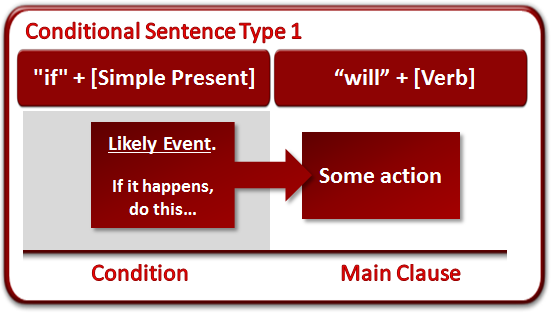Loại 1: Điều kiện có thể xảy ra ở hiện tại hoặc tương lai.
Ví dụ: If I have enough money, I will buy a new car.
Cấu trúc: If + Thì hiện tại đơn, Thì tương lai đơn
* Loại 2: Điều kiện không thể xảy ra ở hiện tại hoặc tương lai -ước muốn ở hiện tại. (Nhưng thực tế khổng thể xảy ra được).
Ví dụ:
– If I had millions of US dollars now, I would give you a half. ( I have some money only now)
– If I were the president, I would build more hospitals.
Cấu trúc: If + Thì quá khứ đơn, S + would/ Could/ Should + V
Chú ý: Ở câu điều kiện loại 2, trong vế “IF”, “to be” của các ngôi chia giống nhau và là từ “were“, chứ không phải “was“.
* Loại 3: Điều kiện không thể xảy ra trong quá khứ – mang tính ước muốn trong quá khứ. (nhưng thực tế khổng thể xảy ra được).
Ví dụ:
If they had had enough money, they would have bought that villa.
If we had found him earlier, we might/could saved his life.
Cấu trúc: If + thì quá khứ hoàn thành, S + would/ could/ should + have PII + O.
* Loại 4: Cấu trúc này dùng để diễn tả một sự việc trái với Quá khứ dẫn đến một kết quả trái với hiện tại.
Ví dụ:
If I had been born in town, I would like life there.
(the fact that I wasn’t born in town, so I don’t like life there now)
Cấu trúc: Clause 1 (would + V) if + Clause 2 (had + P2)
- Các cách diễn đạt khác của câu điều kiện
3.1. Loại 2
Ví dụ:
You help me everyday so I can finish my work.
→ But for your daily help, I couldn’t finish my work.
She encouraged him and he succeeded.
→Without her encouragement, he wouldn’t have succeeded.
The teacher explained and we understood.
→ Were it not for the teacher’s explanation, we wouldn’t have understood.
Cấu trúc: But for/ without/ were it not for + noun, S would/ could/ should + V
3.2. Loại 3
Ví dụ:
If he had n’t got my book, he couldn’t have written well the thesis.
-> But for my book, he couldn’t have written well the thesis.
If they hadn’t helped me, I wouldn’t have finished that work.
-> Without their help, I wouldn’t have finished that work.
It rained and we had to cancel the match.
-> Had it not been for the rain, we wouldn’t have cancelled the match.
- Đảo ngữ câu điều kiện
3.1. Điều kiện loại I
- Nếu trong câu có “should” ở mệnh đề “if“, thì đảo “should” lên đầu câu.
Ví dụ:
If he should ring , I will tell him the news.
→ Should he ring, I will tell him the news.
- Nếu trong câu không có “should”, chúng ta phải mượn “should”
If he has free time, he’ll play tennis.
→ Should he have free time, he’ll play tennis.
If she comes early, we’ll start.
→ Should she come early, we’ll start.
3.2. Điệu kiện loại II
Ví dụ:
If I were a bird, I would fly.
→ Were I a bird, I would fly.
They would answer me if they were here.
→ Were they here, they would answer me.
- Cấu trúc: Nếu trong câu có were ở mệnh đề ” if “ thì đảo were lên đầu câu và bỏ if đi.
Ví dụ:
If I learnt Russian, I would read a Russian book.
→ Were I to learn Russian, I would read a Russian book.
If they lived in Australia now, they would go swimming.
→ Were they to live in Australia now, they would go swimming.
- Nếu trong câu không có động từ “were” thì mượn “were” và dùng “ to V”.
3.3. Điều kiện loại III
• Đảo trợ động từ của thì quá khứ hoàn thành.
Ví dụ:
If it had rained yesterday, we would have stayed at home.
→ Had it rained yesterday, we would have stayed at home.
If he had trained hard, he would have won the match.
→ Had he trained hard, he would have won the match.
Chú ý: Ở dạng phủ định, “not” được đặt sau chủ ngữ:
Ví dụ: Had it not been so late, we would have called you.
- Cách dùng với unless
Lưu ý rằng “Unless” cũng thường được dùng trong câu điều kiện, lúc đó “Unless = If ….. not”.
Ví dụ:
Unless we start at once, we will be late = If we don’t start at once we will be late.
Unless you study hard, you won’t pass the exams = If you don’t study hard, you won’t pass the exams.
